Robyn Ryle's Blog, page 2
May 16, 2018
Writing a novel (yes, another) and the beauty of trivia night
I recently discovered trivia night at one of our local bars in town and the timing couldn’t be better.
Many years ago, I read an essay by Orhan Pamuk, a Turkish writer. He talked about the loneliness of the writer’s life. In the end, he said, you must resign yourself to being alone in a room. There’s no way around it. Even if you’re sitting in a room with other people while you’re writing, you are still essentially alone. You must turn your back on the world that exists for a while in order to create a new one. There’s no way around it.

The secret to trivia night is beer.
I didn’t want to believe him. I read the essay right at the point in my life when I was tired of being alone. I was about to meet my future husband and to become a parent. I was tired of being the single woman in a community full of married people, which might be about the loneliest thing there is. I thought of myself as a fairly social introvert (Is that a thing? I don’t care if it’s a thing or not. It describes what I was at that point in my life.) I did not believe that writing was a lonely thing. I would do it differently. Though, really, I just didn’t do it at all.
Fast forward to almost fifteen years later (Oh my god, what happened? How did time move that quickly? Stop!). Okay. Pamuk was right. Writing is lonely. You’re on sabbatical. Your husband isn’t. Your child is at school. You’re alone in the house for hours of the day. You’re writing. That’s good. You’re totally absorbed in the writing. Well, really, not at first you’re not. But you get to a good point in the business of novel writing. You get to a place where if you didn’t have to do things like eat and sleep and move your body, you feel like you could spend the whole day doing nothing but writing. This may or may not be healthy.
When your husband comes home from teaching, you talk and that’s good. You married well, so your husband is perfectly willing to listen to you blather on about how the writing went. (Oh my god, you’re one of those people! You’re a person who talks about how the writing’s going! How did that happen?).
But you need more. You need people and inane conversation. Conversation that has nothing to do with writing at all. You need trivia night. And beer. You also need beer.
What is it about trivia night? It is drinking with a purpose. It is social. It is low stakes. (Well, okay, not really low, low stakes, because I am super competitive and I want to WIN!) You don’t have to talk about anything serious at trivia night. You can spend the whole night trying to list Sandra Bullock movies. Or debating whether Savannah is really farther north than Tucson. Trivia night, my friends, is like potato chips for your brain. And when you spend all day submersed in the world of novel writing, you need potato chips for the brain.
Trivia night in Madison is low tech. Obviously, you’re not allowed to use your phones. You write the answers on a piece of paper and walk them up to the moderator. Yep. None of these fancy machines for us.
Trivia night is perhaps what a bowling league might have been like once upon a time. There are regulars. Friendly rivalries. (Sort of, but really, Joe and Sean, we’re totally going to kick your ass next time!) And, of course, there’s beer.
I’m mildly obsessed with the life of hunter/gatherers (Ask my students. Ask my friends. Ask my poor husband.) What did hunter/gatherers do for fun? There was no Netflix. No movies. No YouTube. They sat around and talked and sang and told stories. They hung out. We’ve sort of lost the art of hanging out, but perhaps trivia night can save us. Or if not, at least there’s beer.
April 11, 2018
Madison Monday: Stained-glass windows

Taking the windows down in November.
Living in an old house in downtown Madison is a porous sort of way to live. The boundaries between you and the rest of the world are leaky. The outside seeps in and your inside drifts out. This can be good or bad. It’s bad when the screaming argument on the street wakes you up at two in the morning coming through your windows. It’s good when you get a front row seat to all sorts of interesting things happening just outside your door.
For the past few months, we’ve had a front row seat to the restoration of the stained-glass windows in the Prince of Peace church next door. Well, we’ve had a front seat to all the work being done on the church, including the removal of the steeple (it’s coming back) and the taking down of one of a chimney (it’s not coming back). We’ve become quite friendly with a series of teams doing this work, but by far the most fascinating part are the windows.
Back in November, we watched the first team of workers remove the windows, pane by pane. Interesting fact about stained-glass window panes—they’re flexible. They bent and wobbled as the workers carefully removed them. Watching the workers remove a pane from the top of a window and then work it slowly down the scaffold to the ground was a great lesson in the suspense in the everyday. Would they drop it? Would the window wobble into pieces? Some mornings, I sat on the couch in our kitchen with a cup of tea and bated breath, watching.
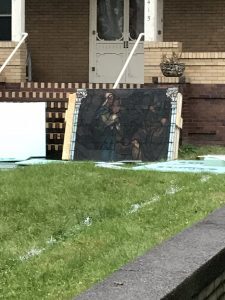
Packing them into crates.
Afterward, it was disorienting to see the windows broken down into bits and pieces, often stacked around the yard in front of the rectory. A reminder that these windows which are so beautiful are also deeply fragile.
The workers built each crate to send the windows off to wherever they were cleaned and restored. This was probably the slowest part of the process, as each crate was clearly made to order. They marked pieces of Styrofoam inside the crates with letters and numbers, so they’d know where each puzzle piece fit when they returned. The windows on our side of the church were filled in with white plywood, while the windows on the other side still had some glass in them after the stained-glass was removed.
This week, the windows came back. In a U-Haul truck, of all things. A different set of workers are reinstalling them pane by pane, about one window per day. We haven’t gotten the full effect yet, of the sun setting on the other side of the church and lighting up the windows on our side of the church like our own personal fireworks display. But soon enough. And it’s a comfort to have them back as a wondrous feature in the background of our everyday lives. They’re like old friends back from a pleasant and restorative vacation.
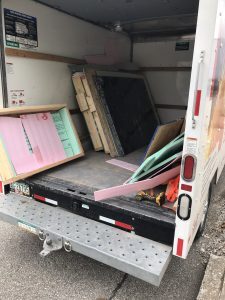
In the U-Haul.
It’s a little disconcerting sometimes having people working on the building right next to you every day. It can be noisy. We tell ourselves that the workers aren’t as interested in what’s going on inside our house as we are in what they’re doing because the windows go both ways. We can see out and they can see in. The cats are deeply freaked out by strangers in their territory.
But where else would you get the opportunity to watch such a delicate and fascinating process up close? How many people are there who do this kind of work? How do you become someone who works with stained-glass windows? Where did the windows go to be restored? Do the workers take pleasure in the beauty of the windows they’re so delicately maneuvering?

Putting them back in.
I’m not a religious person, but you don’t have to be to appreciate the beauty of the windows. They speak to a time when we believed that our world should be full of beauty and we built it that way. It’s good to see that belief affirmed and in this small way, restored.
April 4, 2018
She/He/They/Me Cover Reveal and Dear Mr. Henshaw
 Yesterday I got to share the amazing cover for SHE/HE/THEY/ME with the world. It is a thing of beauty! And, both the title and the subtitle rhyme, which makes me so, so happy. Like, verifiably happy. I read once that the sound of an alliteration (like, say, the name, Robyn Rae Ryle) or a rhyme makes us happy, just to hear. I believe it and I’m so proud of the awesome style of the cover and all the hard work from everyone at Sourcebooks that went into it.
Yesterday I got to share the amazing cover for SHE/HE/THEY/ME with the world. It is a thing of beauty! And, both the title and the subtitle rhyme, which makes me so, so happy. Like, verifiably happy. I read once that the sound of an alliteration (like, say, the name, Robyn Rae Ryle) or a rhyme makes us happy, just to hear. I believe it and I’m so proud of the awesome style of the cover and all the hard work from everyone at Sourcebooks that went into it.
It’s now less than a year until the book will be out in the world (March 2019, to be exact). The official acknowledgements are written, but I’m writing a series of blog posts about all the people, events and situation that helped me along the way. Today it’s Beverly Cleary.
In fifth grade, I read Dear Mr. Henshaw. It’s an epistolary novel, or a novel written in letters. The parents of the main character, Leigh, are divorced and he’s moved to a new town. He starts writing letters to his favorite author for a class assignment. Eventually, the author writes back.
I’ll confess I had to look up this plot summary and that my memory of the book is different from the reality. The way I remembered it, Leigh was writing to his former teacher. I didn’t remember anything about the divorce or the author or that the author writes back.
What I remember was the idea of writing letters, but not necessarily to your favorite author. I tried that, eventually. Issac Asmimov probably got a few letters from me in my adolescence. But it had never occurred to me how writing, “Dear _____” could open a flood gate for words that otherwise might be hard to come by. Reading that book revealed to me how a salutation could become sort of invocation, a bit of writing magic that allowed you to say things you normally wouldn’t.
After reading Dear Mr. Henshaw, I started my first diary. It was blue and small with a lock that quickly broke. I began every entry, “Dear Diary,” and went from there. I still have the diary and so I can tell you that it is very, very boring. I record what we had for dinner and which of my friends were mad at each other and then when they reconciled (often on the same day). There was a lot of anger toward my sister (sorry) and irritation and my little brother (sort of sorry). There are many stars and exclamation points. The most exciting thing that happens is when I “go” with Craig Wilmhoff for a sum total of 12 hours, most of them spent asleep.
The point is not that the diary was exciting or particularly well-written. The point is that it started me on a path of daily writing that lasted into high school. The blue diary was replaced by a red one, also with a lock that broke. And then with larger and larger notebooks, absent the pointless lock.* Eventually I settled for simple spiral-bound notebooks and these began to include stories along with the diary entries, the two types of writing intermingling. I still have those, too, and they’re definitely more interesting, though still surprisingly repetitive.
In the later notebooks, I dropped the salutation. There was no, “Dear Diary,” because I’d decided that was for babies. But you can argue the “Dear Diary” was still implied. I was writing to someone. Maybe a future version of myself. Maybe some part of me that cared deeply about all the boring details of my life. But I was writing and that’s what mattered. I believed my words were important.
I stopped keeping a regular diary in college, though I still wrote. And then during what I sometimes think of as the Lost Years of graduate school, I stopped writing pretty much altogether. Academic “writing” was not really writing at all and almost completely destroyed the writer inside me, which is a whole other story.
But it’s funny how in some ways, that salutation never went away. When I started writing my blog way back in 2010, it was an updated version of those diaries. There was an audience out there, even if originally it was an audience that existed only in my head. And I still find it so much easier to write a blog entry than I do an essay that’s not for the blog. I think that’s because of the audience. I know who I’m writing my blog to and for. I have no idea about an essay.
While he was working on East of Eden, John Steinbeck warmed up every morning with a letter to his friend and editor, Pascal Covici.** The letters weren’t meant to be sent, as they were written in the same notebook in which he was drafting the novel. Steinbeck compared it to a pitcher warming up. He needed that specific audience to get the words flowing. I was talking to a writer friend recently and she described how working on the last part of her memoir was easier if she imagined the chapters as written to a specific person.
Writing happens largely in isolation. A salutation, even when it’s implied, is an act of faith, a belief that there’s someone out there and they’ll find your words someday. It’s a reminder that your words matter. Dear Mr. Henshaw. Dear Diary. Dear Blog Readers. Dear Pascal. Dear Friend. Dear World.
*I have no idea if any of my family members ever read my diary, but I doubt it, because, again, they were so, so boring.
**You can read all these letters in The Journal of a Novel and they are fascinating. Also, deeply reassuring if you’re a writer or an artist to see Steinbeck struggling so mightily with what would become a masterpiece.
March 2, 2018
Mrs. Hendrickson and the flower poem
In about a year, my book—SHE/HE/THEY/ME—will be out in the world. It seems like a long time to wait, but I know it’ll go fast.
I recently sat down to start writing the acknowledgements and realized it was the sort of thing that could go on for pages and pages. I’ll be forty-five when my book comes out and there are a lot of people and places and groups and events that stand in between the little girl who knew she wanted to a writer and the person who will finally have something tangible to show for that dream.
But, hey, I have a blog, I thought. I can’t tell my whole writing life story in my acknowledgements, but I can on my blog. I tossed the idea around for a while. Did it seem to narcissistic? Too self-indulgent? This is a question I face almost every time I sit down to write a blog post or an essay. Does anyone really care?
Maybe it is narcissistic, but it’s also about gratitude. I owe a lot of people, in ways big and small. Writing is such a stupid and torturous thing to do with your life. It is sometimes lonely and sad and horrible. You can’t keep going on your own. You need people. These are the people and places and events that were there when I needed them. This is that story.
 I grew up lucky enough to always have words in my life. My mom bought books and books and books to read to me and my siblings when we were little. She still has attics full of books. There was a preponderance of Dr. Suess, so it’s probably not surprising that the first thing I can remember writing was a poem. And it rhymed. It was about flowers and Mrs. Hendrickson, my third-grade teacher. I think there might have specifically been a mention of tulips.
I grew up lucky enough to always have words in my life. My mom bought books and books and books to read to me and my siblings when we were little. She still has attics full of books. There was a preponderance of Dr. Suess, so it’s probably not surprising that the first thing I can remember writing was a poem. And it rhymed. It was about flowers and Mrs. Hendrickson, my third-grade teacher. I think there might have specifically been a mention of tulips.
Mrs. Hendrickson was a tiny little woman and I can’t help but think this is why we all loved her so much. She seemed to be frozen in perpetual childhood. Everything about her was small. Small face, small hands. I can only remember her smiling. She had long black hair which she wore in a braid, though sometimes I think she would let the girls in our class brush it or braid it. Is that even possible? It’s hard to imagine that sort of intimacy in classrooms today.
I remember that Mrs. Hendrickson always seemed exotic to me. Her hair was so black and straight. I picture her wearing skirts all the time, though I have no idea if that’s right or not. With time, you layer things onto your memories to make them fit into some particular narrative.
Whoever she was and wherever she was from, Mrs. Hendrickson was the kind of teacher who inspired poetry. The poem I wrote for her is lost to time, so I can’t tell you how good or bad it was. I suspect it was fairly bad given that I was nine years old. But Mrs. Hendrickson liked it. Or like the amazing teacher she was, she pretended to like it. What I can remember is her enthusiasm and perhaps a note to my parents or a mention at an open house. “Robyn wrote a beautiful poem,” she might have said.
I remember memorizing the poem. Perhaps showing it to my grandparents. I see myself sitting on my grandmother’s couch and someone saying, “You should be a writer.” Or, “You will be a writer.”
I remember a sort of internal glow. Yes, I was good at this. That is what I would do. This was something I understood. A writer was the person who made all the books I loved. It was as simple as that to me. I would make books. I would be a writer.
P.S. I’ll be reading with the amazing Leesa Cross-Smith and Sarah Jarboe at Carmichael’s Books next Thursday, March 8 at 7:00. Check it out, here.
February 19, 2018
Madison Monday: Key West edition
Happy Monday from Key West, where the sun is shining and I am on my second day of two weeks in paradise. Seriously. Two whole weeks! This may be the best idea I’ve ever had.

My view.
Taking the shuttle from the airport, I rode in with a couple who were here for their first visit. I told them this would be my fifth time. “So what do you recommend doing in Key West?” the woman asked.
I hesitated. “Being,” is what I wanted to say. “Being warm. Being away. Being in a place where I can walk or bike to most everything important. All of that. But mostly, just being.” That’s what I come to Key West for.
I come over and over again, I think, because my husband and I are home-bodies, deep down in our bones. We don’t really like leaving the house, even in the full knowledge that quite enjoyable things happen when we do leave the house. But we’d still rather stay home almost all the time. Traveling is hard on home-bodies.
A good strategy to offset the home-body tendency is to go back to the same place over and over again. Now you’re not really going “away.” You’re going to a different home. A place where you know what to expect. A place that has its own comforts. You can build a routine. Breakfast at the French bakery on Duval and an hour or two reading/writing there. A walk down to the other end of the island to sit and watch the boats come and go. Back to the pool. Out for dinner. It may sound strange, but I love routine. I love the idea of a vacation in which you can develop a routine. Call me boring. That’s just how it is.

Houseboats.
This time, I’m alone in Key West for the first four days, because I’m on sabbatical and Jeff is not. These four days are my own sort of writing retreat. And here I am, doing some actual writing.
On the first day down here alone, I wondered to myself, what am I doing? Why am I doing this? What kind of insane person goes on vacation alone? I don’t know the answer to that. On day two, it’s not a question I’m asking, anyway. I miss my husband and my daughter and my cats. But being alone is something I can sink into contentedly, like a hot bath.
Key West is not a big place, but today I did some serious biking to explore parts unknown. I saw these houseboats and wondered where they went during Irma. Last night, I biked by the cemetery at dusk. I cruised through the neighborhoods and saw people out on their porches and balconies, enjoying the evening. I picked up a sandwich at this adorable little restaurant. As my husband will tell you, when I travel, I am drawn to the neighborhoods. The places off the beaten path. I like to try and see how people live.
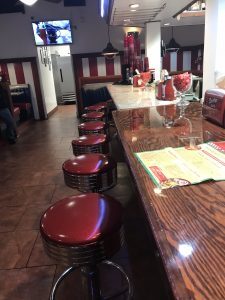
Sandy’s Cafe.
It is really hard to live in Key West. There was a shortage of affordable housing before Irma. The hurricane made it even worse. Today I biked by some public housing. Even in paradise, it still looked like public housing, which is sad. There’s no law that says public housing has to announce itself to the world.
I like coming back to a place over and over again because I believe there is something so valuable in knowing a place deeply. I believe every place is interesting (though some, admittedly, more than others), if you just look hard enough.
So that’s what I’m doing. Looking. Being.
February 5, 2018
Madison Monday: The List, 2018
I looked back through old Madison Monday posts this afternoon, trying to find some ideas for what to write about. There are a surprising number of posts with ‘winter’ or ‘snow’ or ‘cold’ in the title. I can only presume this is because being mostly forced to stay indoors in the winter, I spend more time writing blog posts. In the summer, I’m too busy gardening. Or maybe blogging is my way to deal with surviving the long winter? At any rate, I’m resisting the urge to comment on the weather today (even though it really is very cold).
I was looking through old posts partly in order to find a list I made once. It was a list of things that I wished Madison had, made when I first moved downtown. Many of the things have long since been crossed off. A bookstore (Village Lights). A place to buy good wine and beer (Madison Apothecary). Others have been lost, like the best restaurant/food/beer/wine/community hang-out/great good place ever (The 605 Grille).
Some things on the list (as I remember it) are still missing. We have good Chinese restaurants (as the ever-reliable people at Hong Kong Kitchen) and Mexican restaurants (though it would be lovely to have one downtown). There’s also sushi.
But I know I’m not alone in wishing for an Indian restaurant in Madison. Or maybe, as much as it would horrify my husband, a Thai place.
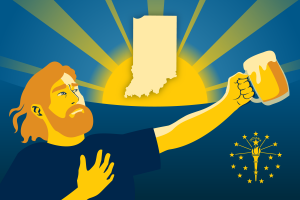
I have no idea what this picture is, but it seems to capture how I feel about beer
I don’t remember if a brewery was on the list, but, of course, it should have been. Every single town in Indiana except Madison has a brewery. I’m not exaggerating. You can’t drive ten miles in our state without running into a brewery. That Madison still doesn’t have one is a mystery on par with the Bermuda triangle or Amelia Earhart. Maybe we are the Bermuda triangle of breweries?
The list I’d make now is fairly small, I have to confess. I buy my shoes in Madison (at Hertz, and they are oh-so-stylish). My candy (Cocoa Safari). Some, but not all produce (Datillo’s). My soap (Fountain Alley), my shampoo (Mane Attractions). Of course, my books and wine and beer and gin (lots and lots of gin). My coffee (The Red Roaster) and most of my unhealthy snacks (Dollar General). Our appliances (Greves) and much of our furniture and décor (Ditto’s and more recently, WOW What a Find!). I get my massage (from the world’s best massage therapist at EcoMassage).
I’m lucky enough to have a fairly flexible working life (super-flexible right now, as I’m on sabbatical), so I have the time to walk from place to place to do my shopping. And it’s a pleasant experience. I mean, tourists come here to shop at the places that I just take for granted.
What would be on your list for Madison? What is it we’re still missing?
P.S. I’m going to try opening up Madison Monday to guest posts as a little experiment. If you have a story or something you’d like to say, fill out the contact form here on the blog. Let me know your idea or send me a draft of your completed post pasted into the message.
February 2, 2018
Writing Thoughts: How to win the lottery
I drove down to Louisville to have lunch with my lovely sister this week. In the car on the way there, I listened to one of my favorite podcasts, Reply All (a great recommendation from Cathy Day). Reply All is about “technology” and “the internet,” but really it’s about humans and all the weird ways they intersect with those two things. Sometimes the “technology/internet” connection is pretty thin and that’s just fine with me.
Listening to Reply All keeps an old person like me marginally hip to the whole world of things like famous Instagram dogs and bots and, in this episode, beauty YouTubers (yes, that’s a thing). There was a whole thing with a beauty YouTuber sending subliminal messages on YouTube, but that is not the point of this post. This particular beauty YouTuber had about 600,000 and in the episode it became clear that these were not particularly impressive numbers. To be an impressive YouTuber, you need at least a million followers. At least.
A woman listening to this episode wrote in to the Reply All guys to say that hearing these numbers broke her heart. The woman has her own YouTube show where her and some friends try various food (I think that’s the gist of it—you can see the limits of my YouTube knowledge showing here). She was ecstatic about having 600 followers. Like, she celebrated reaching 500 followers. Then she heard on Reply All that 600 followers was nothing. In fact, it was sort of pathetic in the world of YouTubers.
What was she doing wrong, she asked one of the Reply All guys. She worked hard on her YouTube show. She’d like to be able to quit her job and do her YouTube show full-time. Was there a secret Google algorithm out there somewhere that would allow her to become a real YouTuber, someone with a million followers? What was the secret, she wanted to know.
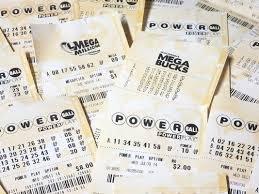 The Reply All guy didn’t really have an answer, but it made him think of a speech he’d heard at XOXO. XOXO is some sort of tech/internet conference. Don’t ask me. I don’t know what it is, either. But you can watch the speech he was talking about here. It’s a talk by Darius Kazemi, who is an internet…artist? Yeah, I didn’t know there was such a thing, either. Stay with me, though.
The Reply All guy didn’t really have an answer, but it made him think of a speech he’d heard at XOXO. XOXO is some sort of tech/internet conference. Don’t ask me. I don’t know what it is, either. But you can watch the speech he was talking about here. It’s a talk by Darius Kazemi, who is an internet…artist? Yeah, I didn’t know there was such a thing, either. Stay with me, though.
Here is the takeaway from Kazemi’s talk—becoming a YouTuber with a million followers is essentially like winning the lottery. It is mostly out of your control. Sure, there’s a base level of effort you need to put in. That’s like the equivalent of buying the lottery ticket. You have to buy the ticket. But once you buy the ticket, the rest of it is largely out of your control. It’s a one in a million chance.
This is not what many people will tell you. They’ll tell you that becoming the next big thing is all about stuff like hard work. Or building a community. Or being in tune with the zeitgeist. Or being persistent. People will imply that there is a secret to this kind of success and they have it and you, too, can be like them.
But Kazemi’s like, nope. Not how it works. You do have to buy the ticket. But out of 125 projects he did in a year, only about 8 of them really took off. The rest pretty much tanked and there’s nothing that really explains the difference between the ones that tanked and the ones that didn’t. It’s mostly luck.
If you believe in the truth of what this guy’s saying, I can imagine at least two possible reactions. One is despair. Whether your YouTube channel gets millions of followers or your book becomes a bestseller or your invention changes the world is largely about luck. You have to make the YouTube show or write the book or actually invent something. You have to buy the ticket. But after that, a lot of it is out of your hands. How depressing. What’s the point?
That’s not my reaction. I find the lottery model comforting and certainly truer to my experience. As a writer, I know there are some very shitty books that make it onto the bestseller list. You can do whatever mental gymnastics you want to explain why and how that happens, but I believe Kazemi’s right—it’s mostly just luck.
It doesn’t mean you don’t go on buying the lottery ticket. You’re never going to win if you don’t play. But it might be healthy to accept that playing by itself, and even playing really well, might not be enough. You have to decide if you want to go on buying the ticket.
Because here’s what Kazemi doesn’t say. So you never win the lottery. Did you have fun playing? Does that woman who wrote in enjoy doing her YouTube channel? Do I like writing? Most days, yes. Could I be okay with winning $100 on a scratch-off instead of the jackpot? Sure. The small victories are still pretty exciting. The rest of it is up to chance and there’s a deep comfort for me in knowing that.
P.S. I also listened to a fascinating episode about tulpas, which you can find here, and might sort of blow your mind.
P.P.S. Also this episode about medical mysteries and Hickan’s dictum.
January 29, 2018
Madison Monday: Finding Your Audience
When I tell people around town that I’m on sabbatical, some of them ask, “So will you be writing on your blog again?” They ask this in a way that I believe implies that they want the answer to be yes. Maybe I’m wrong, but I’m going with that.
It’s a nice thing, of course, to know that people want to read what you write. Who am I kidding? It’s absolutely FANTASTIC to know that people want to read what you write! It’s an incredible gift from the universe. Please, if you see me around town, feel free to say this to me as often as you like. I might not appear to be as totally delighted as I am deep inside my stoic, Midwestern soul. But I will be.
I wrote for my blog pretty intensely the last time I was on sabbatical because, hello, sabbatical! I had more time and as I wrote earlier, more alone time. More alone time means more wandering down those weird thought-paths that really only happen when you’re alone. Both of those things together lead to more blog posts.
But there’s another reason my blogging fell off in the last few years. I had a conversation with a fellow writer and blogger in which I realized that blogging was, in some sense, the same as publishing your writing. This is both good and bad.
Of course, part of the point of writing a blog is that other people can read it. If I wanted to write without anyone ever reading it, I would keep a journal. So, yes, blogging is publishing in the sense that you are making your writing available to the world. Once it’s up there, it’s available for the whole world to see.
In other ways, blogging is very much not publishing. It’s not curated in any way. I can say whatever I want. I can (and do) spend some time carefully editing my writing. But I don’t have to. There are no gatekeepers in blogging. I heard on a podcast recently about a guy who blogged quite extensively from a maximum-security prison. He didn’t have internet access so he wrote out his blog posts and then mailed them to his mother, who dutifully posted them on his blog. Proof, if you needed it, that anyone can blog.
You also don’t get paid for blogging. At least, I don’t because I don’t have any ads. Even if I did have ads, I wouldn’t make much money from them. You need much more traffic than this modest little website gets to earn money from a blog.
But if I go to submit an essay I’ve written on my blog to a magazine or literary journal, many won’t consider it because it’s already been published. In that sense, blogging is publishing.
At the same time, as a writer, you want to be able to submit your essays to magazines and literary journals for publication. In theory, this is how you gain the all-important recognition. If you’re very lucky, it might also be how you get paid for your writing. Very lucky. I’ve been paid exactly once for writing that appeared in a magazine. Once.
So you’re left with a bit of a quandary as a writer. Should I post this essay on my blog, which is in many ways not considered publication*, or should I submit it to a magazine or literary journal in search of that “recognition,” and just maybe, pay?
There was a period when I decided the answer was no to the blog and yes to publication somewhere else. If I was going to build a career as a writer, I needed to publish somewhere besides my blog. So a lot of essays that might have gone up here got submitted to magazines. Sometimes they got accepted. Most of the time they didn’t. Only once did I actually get paid (a whopping $200 for the record, from Gawker, a gig I got only because I knew the writer who was editing a series there).
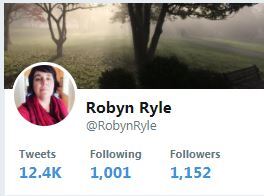
My Twitter game is so sad
In theory, publishing in magazines and other places besides your blog helps to build an audience for your writing. In theory. How do you measure that audience? I have no idea. Twitter followers? I have a whopping 1,1524 followers on Twitter. If you are unfamiliar with Twitter, let me assure you that this is not an impressive number. This is not a book deal type of number. Are there book deal type of numbers? Yes, there absolutely are. I don’t have them.
But I do have a book deal now (have I mentioned that?). And I have an audience for my writing—those people in Madison who ask me if I’m going to start writing on my blog again. Those folks who mention a post when I see them in the coffee shop. The people—near and far—who comment on my posts or e-mail me about them. My friends, yes. My family, too. That’s an audience. It’s a small audience, but it’s an audience I can see and talk to. It’s an audience that showed up at the reading for my little chapbook here in town. It’s a good audience. It’s a worthy audience. There’s nothing wrong with writing that’s for them.
In fact, there’s something sort of amazing about writing for an audience you know. It’s a gift.
Which isn’t to say that I don’t still send essays in another direction every now and then, too. I do. But it’s also just fine to keep it here. To keep it local, so to speak. To use what I think of as my blogging voice, the one that sounds like I’m sitting down for a conversation with a friend or a neighbor. Because I am.
* Blogging also doesn’t count toward tenure if you’re an academic, even though a post you write can have a much wider audience than any essay/story/poem you publish in an obscure literary journal. Cathy Day has a great post about this, here.
January 24, 2018
I am a failed novelist
I recently saw this FB post going around with Will Smith talking about the importance of failure and I can’t agree more. Failure is super-important in so many different ways. Meditation is all about failure. You sit and your thoughts wander—failure! But that’s the point. Your thoughts wander and you bring them back. Over and over again. That’s all meditation is and if you don’t fail, you don’t ever learn how to bring your thoughts back to the present moment. Without failure, there is no mindfulness.
Failure is also super-important to writing. I’ve written five novels and all of them are failures. Big failures, because writing a novel isn’t any easy undertaking. Writing a novel takes time and effort and a lot of moments of incredible pain and misery. Well, okay, it’s not all that horrible. But it ain’t no picnic, either.
How do you know that all the novels you’ve written are failures, you might ask? That’s a good question. If you have any suggestions for an answer, let me know. When I say I’ve written five novels that are failures I mean that none of them have become published books. That’s one definition of failure. It’s a very narrow definition of failure. There are many great novels that never become published books.
I wrote five novels, and as I explained above, that’s no easy thing. So that I wrote them is not a failure. There are many, many people who would like to write a novel and never do. You can argue that every novel that actually gets written is by definition not a failure.
Some people have read these failed novels and quite enjoyed them. They’re mostly my friends or my husband, so they could be lying. But surely not for all five of the novels. I like the novels I have written. They give me pleasure. They make me laugh and sometimes cry. That is not a failure.
I won’t lie to you—I’ve spent a lot of time thinking that I will always fail at writing a novel. “This is something you just can’t do, Robyn,” is a thought I’ve had more than once. But don’t worry. Most of the time I don’t listen to that voice.
In order to learn how to write a novel you have to fail at writing novels. I think this is just the way it is. Most writers do not publish the first novel they write. Or if they do, the version of the first novel they wrote that gets published is so different from the original that it barely makes sense to call it the same novel.
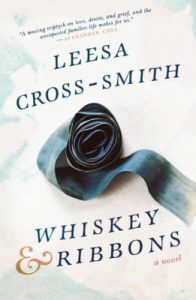
The beautiful cover for Leesa’s novel.
I am not dismayed at my failure to write a successful novel. Okay, sometimes I’m dismayed, but not right at this moment. I don’t even think that the five novels I’ve written will always be failures. Some of them might become “successes” someday. Maybe you’ll get to read them and decide for yourself whether they’re failures or not.
Right now, I’m working on my 6th novel, which is technically a whole new version of my 4th novel (see how that goes?). I’m trying something new, a different approach. It’s taking time and effort and a lot of moments of incredible pain and misery. It might still be a failure in the end.
But in addition to the moments of pain and misery, there are moments of joy and delight. There is the wonder of using these flimsy things called words to make a world and fill it with people. And honestly, I’m not sure I could stop doing it if I wanted to.
So here’s to failing again. Or maybe not.
P.S. Here’s someone who has succeeded at writing a novel and spectacularly so! My friend Leesa Cross-Smith’s novel, Whiskey & Ribbons, will be available from Hub City Press in March. You can pre-order it here or at our local bookstore, Village Lights. I’ll be reading with Leesa at Carmichael’s Bookstore on March 8 at 7:00. Come check it out!
January 22, 2018
Madison Monday: Women’s March
This Saturday a small miracle happened in Madison—the first ever (at least to my knowledge) Women’s March. The march was organized by the amazing women of Madison’s Indivisible chapter. There were speeches and signs and singing and everything you’d expect a march to have. And some things you might not expect.
 My husband and I went, but we stopped at Datillo’s for groceries first, because, you know, they usually close around noon so there wouldn’t be time after. My husband marched up and down Main Street carrying a bag of groceries and that seems appropriate on so many levels. It’s how we small town folks do things—we multi-task. It also seems just right because getting the groceries is part of what a lot of women do—we get the groceries. We think about what’s for dinner. We feed people. And when we have to, we march.
My husband and I went, but we stopped at Datillo’s for groceries first, because, you know, they usually close around noon so there wouldn’t be time after. My husband marched up and down Main Street carrying a bag of groceries and that seems appropriate on so many levels. It’s how we small town folks do things—we multi-task. It also seems just right because getting the groceries is part of what a lot of women do—we get the groceries. We think about what’s for dinner. We feed people. And when we have to, we march.
And, of course, it was my husband carrying the groceries, because, here’s a not so big secret—in our house, he’s the mostly the grocery-buyer. He’s the kitchen cleaner. And the living room cleaner. And, yes, pretty much every other room in the house. This is part of how we figure it out in our house, which doesn’t mean it’s how it should work for everyone. Just that everyone should be able to figure out for themselves, rather than falling back on a set of rules laid out for you. This is what feminism has always meant to me—more freedom for women and men to do what works for them rather than what someone else tells them to do.
So we carried our groceries and we chatted with our friends. Some folks from local businesses stuck their head out the door and cheered or honked their horns as they drove by. We are Midwesterners, so we were aggressively cheerful to people who weren’t marching and they were cheerful back, because those are the rules, at least for mostly straight, white Midwesterners like ourselves.
We marched and I cried because I cry at almost all public gatherings. Parades, weddings and, of course, funerals. But sometimes just at middle school band concerts. I look around and think to myself, “Look at us all, united in our love for our children, which drives us to come sit on uncomfortable seats in a stuffy gym and listen to them play music badly.” What a beautiful thing that is.
There were about a hundred people walking up and down the streets on Saturday, which is pretty impressive for a town of about 13,000. There were older women and men, college students, and one little boy dressed as Thor, hammer and all. There were signs about women’s rights and gender equality, but there were also a lot of signs about DACA and protecting Dreamers. In the best spirit of what a women’s movement should mean, the cause was larger than gender equality.
 A tiny march of about a hundred people may not seem like much of a miracle unless you grew up in a place like Madison. I know for the people in the small town where I grew up, protest doesn’t come naturally. It seems showy, like you’re trying to draw too much attention to yourself. Protest might require you to be outright rude or to shout. You have to push people very far to get them out on the streets and we have been pushed. We have been pushed.
A tiny march of about a hundred people may not seem like much of a miracle unless you grew up in a place like Madison. I know for the people in the small town where I grew up, protest doesn’t come naturally. It seems showy, like you’re trying to draw too much attention to yourself. Protest might require you to be outright rude or to shout. You have to push people very far to get them out on the streets and we have been pushed. We have been pushed.
So a march of about a hundred people in Madison, Indiana, may not seem like a big deal. Or maybe like a canary in the coal mine, it tells us a lot about the state of the world. If you push hard enough, even people in Madison will eventually take to the streets.



